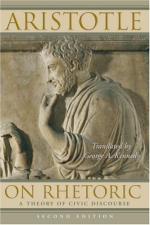
|
| Name: _________________________ | Period: ___________________ |
This quiz consists of 5 multiple choice and 5 short answer questions through Book III, Chapter 10-12.
Multiple Choice Questions
1. According to Aristotle, what was the general difference between enthymemes and examples?
(a) Neither enthymemes nor examples were persuasive.
(b) Enthymemes were more persuasive than examples.
(c) Examples were more persuasive than enthymemes.
(d) Both enthymemes and examples were just as persuasive.
2. How did Aristotle describe arrhythmic prose for speech writing purposes in Book III, Chapter 1?
(a) Too unrestricted.
(b) Too unpredictable.
(c) Too restricted.
(d) Too predictable.
3. What was used in the example that argued the existence of a "non-animal" in Book II, Chapter 24?
(a) Fruit.
(b) Rock.
(c) Leaf.
(d) Tree.
4. According to Aristotle, how was the structure of text conveyed in the periodic prose?
(a) By the length of each sentence and the tone of the orator's voice.
(b) By the flow of words and the tone of the orator's voice.
(c) By the flow of words, the length of each sentence, and the tone of the orator's voice.
(d) By the flow of words and the length of each sentence.
5. Which one of the following was an example of national defense provided in Book I, Chapter 4?
(a) Fortifications.
(b) Risks.
(c) Previous battles.
(d) Strategy.
Short Answer Questions
1. In comparison to the other appeals, how much did Aristotle think that rhetoric resembled the dialectic in the logical appeal?
2. How did Aristotle define a maxim?
3. How did Aristotle think the speaker should present themselves to the audience?
4. What did Aristotle say could not be considered good?
5. How did Aristotle define democracy in Book 2, Chapter 8?
|
This section contains 372 words (approx. 2 pages at 300 words per page) |

|




